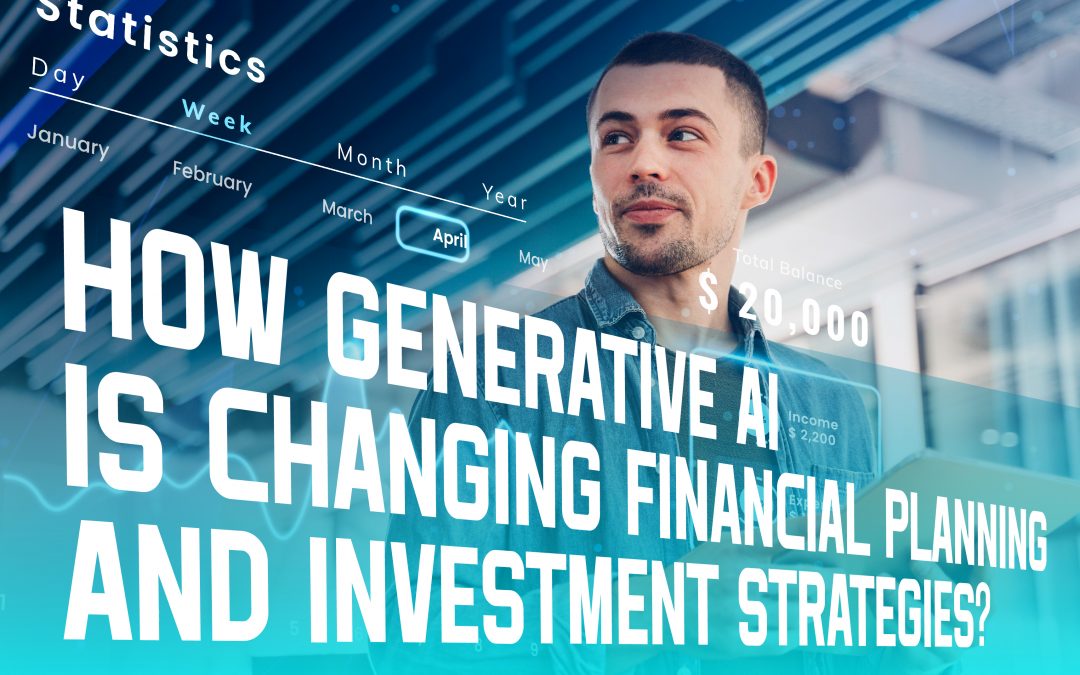Generative AI, a cutting-edge subset of artificial intelligence, is rapidly transforming the landscape of financial planning and investment strategies. This technology, which involves AI systems creating new data or solutions based on learned patterns, is reshaping how individuals and institutions approach their financial decisions. Here’s a comprehensive look at how generative AI is revolutionizing financial planning and investment strategies.
1. Personalized Financial Planning
Generative AI is significantly enhancing the personalization of financial planning. Traditionally, financial plans were often generic and did not cater to individual needs and goals. With the advent of AI, financial planners can now leverage sophisticated algorithms to create highly personalized financial strategies.
- Customized Recommendations: AI tools analyze a client’s financial situation, goals, and risk tolerance to generate tailored investment recommendations. This level of personalization helps in crafting financial plans that align closely with individual needs.
- Scenario Analysis: Generative AI can simulate various financial scenarios based on different market conditions, helping clients understand the potential impact of different financial decisions. This ability to project multiple outcomes aids in better planning and decision-making.
Here’s how different countries are leveraging this technology:
- United States: AI tools such as Betterment and Wealthfront use generative AI to offer personalized investment strategies. Betterment’s AI-driven platform uses algorithms to tailor portfolios based on individual risk tolerance and financial goals. Personal Capital also utilizes AI to provide customized financial advice and wealth management solutions.
- United Kingdom: In the UK, platforms like Nutmeg and Moneyfarm are leveraging AI to create bespoke investment portfolios. Nutmeg uses AI to optimize portfolio allocations, while Moneyfarm’s AI algorithms generate personalized investment strategies based on user inputs.
- China: Ant Financial and JD Finance are prominent in China, utilizing AI to provide personalized financial solutions. Ant Financial’s AI-driven wealth management services offer customized investment recommendations based on user data and preferences.
2. Advanced Investment Strategies
Generative AI is also reshaping investment strategies by introducing advanced tools and methodologies that enhance decision-making and efficiency.
- Algorithmic Trading: AI-driven algorithms can analyze vast amounts of market data and execute trades at high speeds, optimizing trading strategies. These algorithms use generative models to forecast market trends and identify investment opportunities that may not be visible through traditional analysis.
- Portfolio Optimization: Generative AI assists in creating optimized investment portfolios by evaluating numerous variables and potential outcomes. It can balance risk and return more effectively than traditional methods, leading to better investment results.
Country Based Stats:
- United States: In the U.S., AI-driven trading platforms like Renaissance Technologies and Two Sigma use generative models to optimize trading strategies. Kensho provides AI-based analytics for predicting market trends and identifying investment opportunities.
- European Union: BlackRock’s Aladdin and Amundi’s AI-driven tools are examples of how AI is used for portfolio optimization and trading strategies in Europe. Aladdin’s AI algorithms help in managing risk and enhancing investment strategies, while Amundi leverages AI for asset management.
- India: In India, Zerodha and Groww are utilizing AI for advanced investment tools. Zerodha’s Streak platform uses AI to create algorithmic trading strategies, while Groww employs AI for portfolio management and investment recommendations.
3. Risk Management and Forecasting
Effective risk management is crucial in financial planning and investment. Generative AI offers advanced tools for assessing and managing risk.
- Predictive Analytics: AI models can predict market movements and potential risks by analyzing historical data and identifying patterns. This helps investors and financial planners anticipate market changes and adjust their strategies accordingly.
- Stress Testing: Generative AI can perform stress tests on investment portfolios, simulating extreme market conditions to evaluate how portfolios would perform under adverse scenarios. This insight is valuable for understanding potential vulnerabilities and making necessary adjustments.
Country Based Stats:
United States: JPMorgan Chase’s COiN (Contract Intelligence) and Goldman Sachs’ Marquee platform use AI for risk assessment and predictive analytics. COiN helps in automating the review of legal documents, while Marquee provides AI-driven risk management solutions.
Australia: Macquarie Group and AMP are using AI for risk management in Australia. Macquarie Group employs AI to predict market risks and manage portfolios, while AMP uses AI for stress testing and risk assessment.
Japan: In Japan, Mitsubishi UFJ Financial Group and Nomura are leveraging AI for risk management. Nomura’s AI tools are used for predictive analytics and stress testing, while Mitsubishi UFJ Financial Group utilizes AI for enhanced risk management strategies.
4. Enhanced Client Interaction
Generative AI is improving how financial professionals interact with their clients, making financial planning more engaging and informative.
- Virtual Advisors: AI-powered virtual advisors can provide clients with real-time financial advice and insights. These virtual advisors can generate personalized reports and recommendations, making financial planning more accessible and interactive.
- Chatbots and AI Assistants: Financial institutions are using AI chatbots to handle routine inquiries and provide instant support. These AI assistants can generate answers based on the client’s financial profile, improving customer service and engagement.
Country Based Stats:
- United States: Charles Schwab’s Intelligent Assistant and Fidelity’s Virtual Assistant use AI to provide real-time support and personalized financial advice. These AI tools enhance client interactions by offering tailored recommendations and handling routine inquiries.
- Germany: Deutsche Bank’s AI-driven virtual advisor and Allianz’s chatbots are improving client engagement in Germany. These AI tools offer personalized financial advice and support, making interactions more efficient and engaging.
- South Korea: Samsung Securities and KB Securities are using AI chatbots and virtual advisors to enhance client interactions. These tools provide real-time financial advice and support, improving the overall client experience.
5. Ethical Considerations and Challenges
While generative AI offers numerous benefits, it also raises ethical considerations and challenges that must be addressed.
- Data Privacy: The use of AI in financial planning involves handling sensitive personal data. Ensuring data privacy and security is paramount to maintaining client trust and compliance with regulations.
- Algorithmic Bias: AI systems can inadvertently perpetuate biases present in training data. Financial institutions must be vigilant in developing and monitoring AI models to avoid biased recommendations that could negatively impact certain groups of clients.
- Regulatory Compliance: As AI continues to evolve, regulatory frameworks need to keep pace. Financial institutions must navigate evolving regulations and ensure that their use of AI adheres to legal and ethical standards.
Country Based Stats:
- United States: Privacy issues are a major concern, with 72% of financial institutions expressing concerns about AI-related privacy issues (American Bankers Association, 2023). Algorithmic bias and regulatory compliance are also key considerations for U.S. financial firms.
- European Union: The GDPR and the upcoming AI Act are designed to address ethical concerns related to AI. A 2024 report by the European Commission highlighted that 68% of European financial institutions are preparing to comply with these regulations to ensure ethical AI use.
- India: Ethical concerns in India include data privacy and algorithmic bias. A 2023 survey by NASSCOM revealed that 55% of Indian financial firms are actively working to address these issues and ensure responsible AI use.
Conclusion
Generative AI is undeniably changing the landscape of financial planning and investment strategies. By offering personalized financial plans, advanced investment tools, and enhanced risk management capabilities, AI is empowering both individuals and institutions to make more informed and effective financial decisions. However, as the technology evolves, addressing ethical considerations and regulatory challenges will be crucial to ensuring its responsible and beneficial use. As generative AI continues to advance, its role in shaping the future of finance will undoubtedly grow, offering new opportunities for innovation and growth in the financial sector.












